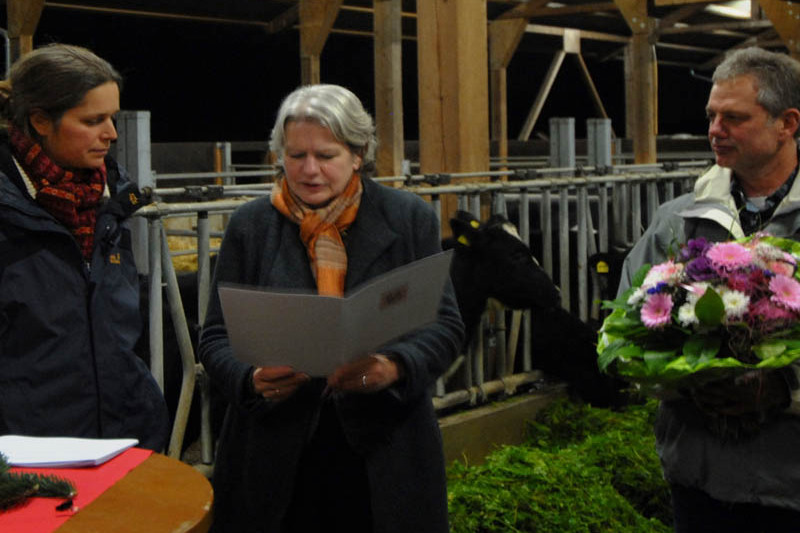Software AG Foundation Congratulates Hofgut Oberfeld on Animal Welfare Award in Agriculture

When examining the development of calf rearing techniques in the last few decades, it is striking that the natural approach of rearing on the mother has been replaced - with great effort - by an artificial approach that separates the calf from its mother. The practice of isolating calves is often justified with the argument that this lessens the spread of disease; the social aspect of cows, however, has been lost from view. Isolating calves means that the calves cannot communicate with older animals, and the transfer of experiences becomes impossible. The question of the wellbeing of the calves and cows is likewise ignored.
Yet consumers who purchase from organic farms often assume that the calves are allowed to grow up with the mother. When this is not the case, consumers' surprise and disappointment can be considerable. The treatment of calves has also increasingly been discussed in the media.
In light of this situation, the farm Hofgut Oberfeld has been practicing a combination of mother-bound rearing and rearing by nurses since 2013; in early 2015 they switched to completely mother-bound rearing. This means that all calves are reared by their mothers for 12 to 16 weeks and have direct contact with her.
This commitment to animal welfare has now been recognized with the first-ever awarded Animal Welfare Award in Agriculture, awarded by the state of Hesse. The certificate was presented to the winning farm by Dr. Beatrix Tappeser, State Secretary for the Ministry of Environment, Climate Protection, Agriculture, and Consumer Protection, during the celebratory award ceremony in the farm's new cowshed.
First prize went to the Antoniushof farm in Fulda, owned by Peter Linz, for its particularly welfare-oriented pig barn and piglet rearing. Two second prizes were awarded: one to the Karlshof farm in Roßdorf, operated by Michael Dörr, for its airy, bright, spacious stables for 300 dairy cows and 270 cattle, and the second to the Hofgut Oberfeld in Darmstadt. Dr. Kathrin Goebel accepted the prize for the mother-bonded calf rearing on behalf of Hofgut Oberfeld, which has 40 cows in its milking operations.
“To encourage people to rethink the issue of animal welfare, one can either point one's finger at the wound and reveal negative examples - or one can point to positive examples that have the potential to gather momentum like a snowball,” said Tappeser. The first-ever Animal Welfare Award in Agriculture was developed to show “best practice” examples that combine animal welfare and environmental and economic sustainability. Dr. Kathrin Goebel of Hofgut Oberfeld agreed with this assessment; she hopes that the newly-introduced award will, in the future, result in the sharing of as many positive approaches as possible. “Mother-bonded calf rearing, in particular, is often criticized as being not practical; but the example of Hof Oberfeld reveals that the opposite is the case. We congratulate this exemplary biodynamic farm on its award,” said Cornelius Sträßer, project manager at the Software AG Foundation.
Animal Welfare Award in Agriculture of the State of Hessen
The award for agricultural farms with animal husbandry operations is designed to recognize operations based in Hesse, whether main operations or side businesses. The award honors farms whose approach to the keeping and management of livestock makes a sustainable and practical contribution to animal welfare and can serve as a model that can be transferred to other farms. The jury consists of eight members who are active farmers as well as representatives of professional organizations, animal welfare, and science. “In the general discussion of the subject of animal welfare in agricultural animal farming, the fact that many farmers have been working quietly for years to integrate more animal welfare into their farming processes sometimes gets lost. That's why today we want to focus on particularly livestock-friendly operations,” said Tappeser during the award ceremony in Darmstadt.
Hofgut Oberfeld
Many people were behind the idea to continue to operate the last working farm in the central city of Darmstadt and to maintain Oberfeld as an open field and a local recreational area as well as to use the farm for organic farming. In the farm's learning center (Lernort Bauernhof), people of all ages have the opportunity to experience agriculture and nature with all of their senses, with both heart and mind. In 2015, over 4,000 participants took advantage of this opportunity.
In addition, the organization Heydenmühlen e.V., also located on the farm, offers living opportunities for people with disabilities, as well as a chance to work on different projects. Many citizens of Darmstadt are shareholders in the Hofgut Oberfeld agricultural joint stock company; many others are members of volunteer organization and donate their time on the farm to assist with construction and to maintain the premises.
The farm is owned by a non-profit foundation, the Stiftung Hofgut Oberfeld, and is therefore protected long-term from speculation. More information is available in German about the Oberfeld Initiative, farm agriculture, and the farm's learning center.
The Software AG Foundation has been supporting Hofgut Oberfeld since its inception and supports countless charitable initiatives that are active there.
